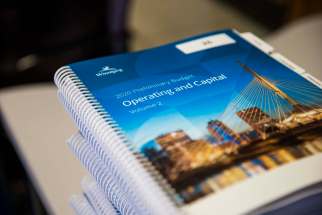Premier shouldn’t play politics with hungry kids Poverty was Pallister's top issue in 2016; in 2020, he blames the poor
Read this article for free:
or
Already have an account? Log in here »
To continue reading, please subscribe:
Monthly Digital Subscription
$0 for the first 4 weeks*
- Enjoy unlimited reading on winnipegfreepress.com
- Read the E-Edition, our digital replica newspaper
- Access News Break, our award-winning app
- Play interactive puzzles
*No charge for 4 weeks then price increases to the regular rate of $19.00 plus GST every four weeks. Offer available to new and qualified returning subscribers only. Cancel any time.
Monthly Digital Subscription
$4.75/week*
- Enjoy unlimited reading on winnipegfreepress.com
- Read the E-Edition, our digital replica newspaper
- Access News Break, our award-winning app
- Play interactive puzzles
*Billed as $19 plus GST every four weeks. Cancel any time.
To continue reading, please subscribe:
Add Free Press access to your Brandon Sun subscription for only an additional
$1 for the first 4 weeks*
*Your next subscription payment will increase by $1.00 and you will be charged $16.99 plus GST for four weeks. After four weeks, your payment will increase to $23.99 plus GST every four weeks.
Read unlimited articles for free today:
or
Already have an account? Log in here »
Hey there, time traveller!
This article was published 06/03/2020 (2109 days ago), so information in it may no longer be current.
In 2016, during the leaders’ debate leading up to the provincial election, soon-to-be premier Brian Pallister said: “I want to work with anyone who wants to address the issues of poverty effectively.”
Telling Manitobans he “grew up poor,” he then promised to change this, saying: “I believe (poverty) is the number one issue for us in this province.”
It’s now four years later.
Poverty in Manitoba has increased since Pallister took office and dealing with it certainly hasn’t become his “number one issue.”
In fact, last April a coalition of organizations and agencies who deal with poverty called Make Poverty History gave Pallister’s record on poverty “a failing grade.”
Then, last January, a national non-partisan network of organizations focused on ending childhood and family poverty called Campaign 2000 issued a report in January stating that Manitoba has the “highest child poverty rate in Canada,” at 27.9 per cent.
Since 2016, Pallister has slashed over $150 million from the Manitoba Housing and Renewal Corporation, closed emergency rooms and services in Winnipeg’s inner city, rejected safe injection programs, raised the deductible for non-Employment Income Assistance to 30 per cent, frozen rent assist benefits for poor Manitobans, and restructured the Neighbourhoods Alive program – resulting in money combatting poverty in Winnipeg’s inner core going elsewhere.
So, with little surprise, on the first day of this spring legislative session this week, Pallister rejected calls from the NDP and the Manitoba Teacher’s Society for a universal breakfast program for Manitoba students.
“If children are going to school hungry, then parents aren’t fulfilling their responsibilities,” the premier said. “Families first, Madam Speaker — not state-funded cafeteria meals.”
At least the 2016 Pallister said he wanted to work with “anyone who wants to address the issue of poverty.” This 2020 Pallister seems to blame parents for being poor (maybe even, his own?).
To be fair, a provincewide universal breakfast program would be costly – estimates are around $30 million – so no one would have blamed the premier if he touted some financial reason for saying no. Announcing that the forthcoming health care demands due to the coronavirus would have probably been enough.
But, instead, Pallister couldn’t help but be cold, judgmental, and political.
“Simply running around saying meal programs, free meals for everybody at a school is somehow a solution,” the Manitoba premier told reporters, “is actually going to encourage an unintended consequence which is to separate the potential for a child to learn and be strengthened by their relationship with their own parent.”
The logic here is lacking, at best.
If feeding a hungry child takes away from a relationship with a parent, I wonder what Pallister thinks his decisions to cut low-income housing, make employment assistance unfeasible, and reduce poverty-fighting organizations does.
Manitoba’s premier is playing politics with hungry kids.
But don’t just take my word for it. As University of Manitoba professor Royce Koop wrote in an op-ed published Friday in The Winnipeg Free Press: “It simply isn’t clear how providing school meals will compel parents to stop spending time with their kids; indeed, the opposite is more likely the case. Transfers to low-income families, such as breakfast programs, can lighten the load on these families, boosting the time available for children and parents to be together.”
Feeding hungry students at school builds relationships with parents, teachers, and improves the overall performance of all students. Period.
In fact, the province reports that it partners with community agencies and organizations to provide almost five million snacks and meals a year to Manitoba children already.
Manitoba is already in the business of feeding hungry children at school. I wonder how many relationships have been destroyed in the process.
This is funny until you realize that there are more and more hungry kids out there.
Many are in poverty due to no fault of their own. Some live in wealthy homes. Some have invested parents, some do not. Some live in the city, some do not.
That’s the thing about hunger: it knows no specificity.
Many hungry children have parents who work early in the morning or late into the night. Some have one parent who is working harder than anything to get by. Some work so hard bills are impossible to pay and time is hard to come by.
These parents are hard-working, tireless, and committed to their children, not irresponsible, whatever Mr. Pallister has to say about it.
These parents don’t need blame, they need support, resources, and time — none of which the premier seemed to have this week.
It all makes one wonder if Pallister remembers at all what poverty was like (like he claims to have experienced) or why he feels such a need to blame parents instead of addressing the root causes of children showing up hungry in school.
The Brian Pallister of 2016 told Manitobans poverty was his “number one issue.”
The 2020 one blames the poor instead.

Niigaan Sinclair is Anishinaabe and is a columnist at the Winnipeg Free Press.
Our newsroom depends on a growing audience of readers to power our journalism. If you are not a paid reader, please consider becoming a subscriber.
Our newsroom depends on its audience of readers to power our journalism. Thank you for your support.
History
Updated on Saturday, March 7, 2020 1:57 PM CST: Headline changed.










